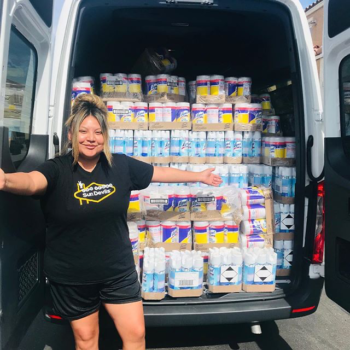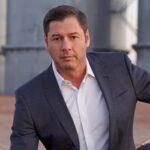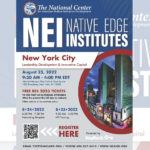Native Health and Business Leader Dr. Crystal Lee Shares Her Story with the National Center
We recently set down with Dr. Crystal Lee, co-founder and CEO of several businesses, including Indigenous Health. Indigenous Health provides direct health care services to Native Americans nationwide. Dr. Lee’s credentials are sterling, with multiple degrees in public health and similar fields, as well as service in the Obama Administration and recognition from the Clinton Foundation. She is also a 2021 recipient of the Native American 40 Under 40 Award.
We hope you take a few minutes to learn more about Dr. Lee, her background as a “REZ Girl from the Navajo Nation,” and how she’s advancing Indigenous health.
- Tell us a bit about yourself and your business (location, tribal affiliation if applicable, type of work, professional background, etc.).
I was born and raised on the Navajo Nation. My tribal clans are Tachii’nii (Red Running into the Water), Tabaaha (Water’s Edge), Tsenjikini (Cliff Dwellers), and
Kin I ichii’nii (Red House). I completed my undergraduate degree(s) at Arizona St. University; MPH and PhD in Public Health degree(s) at University of Las Vegas-Nevada; MLS in Indigenous Peoples Law at University of Oklahoma, College of Law; Predoctoral Fellowship at Johns Hopkins University, Bloomberg School of Public Health; and my Postdoctoral Fellowship at University of California-Los Angeles, David Geffen School of Medicine.
I am the Founder/CEO of several businesses. The first, Indigenous Health, is a mental/behavioral/medical company that provides direct health care services to Native Americans nationwide. The second is United Natives, a non-profit organization that serves Indian Country in education, leadership, culture, health, and civic engagement. And Finally, Dr. b Collections, a Native American fashion line.
In addition, I am tenure-track faculty, Assistant Professor, at the University of New Mexico’s College of Population Health and Adjunct Faculty at the University of North Dakota’s School of Medicine & Health Sciences. I am an Indigenous HIV/AIDS Research Training Fellow at the University of Washington’s Indigenous Wellness Research Institute. My specialty is in infectious disease biomedical prevention research with a focus on Native American health, as well as examining Indigenous health policies at a tribal, state-tribal coordination, national, and international level.
I started Indigenous Health because I believed there was a gap in delivering direct health care services that are culturally responsive, scientifically data driven, and innovative to Indian Country. We do this several ways. Indigenous Health has a team of Indigenous health care providers that deliver the culturally responsive services. We have a mental/behavioral in-patient health clinic in Arizona that provides many services, including: individual/family/group therapy, case management, access to Native American Medicine Men, cultural-based classes (i.e., language revitalization, etc.), food three times/day, transportation, and housing. Indigenous Health also has an out-patient clinic in Las Vegas, NV that provides therapy, case management, and cultural-based classes. In addition, we provide telehealth to urban Native Americans in Baltimore, MD, Washington DC and Boston, MA through sub-contracted work via Native American Lifelines.
Indigenous Health will be introducing the first Indigenous health phone app that will provide tribal communities with access to Indigenous health care providers as well as Native American Medicine Men. Lastly, Indigenous Health will soon provide stem cell therapy and epigenetics sciences using Indigenous frameworks to provide direct health care services.
Aside from my business and public health ventures, I serve as Vice Chair for the Clark County NV, Democratic Party Native Caucus, am Advisor for the Nevada Office of Minority Health and Equity and on the United Nations (UN) North American Indigenous Caucus, UN Indigenous Women’s Caucus, and UN Gender Equality Task Force. I was a Tribal Health Advisor to the Obama Administration and was honored by President Bill Clinton for my work with Indigenous communities at the Clinton Global Initiative. I am the Board Chair for the Las Vegas Indian Center and on the Board of Directors of Diversity and Inclusion for L’Oreal USA.
- If you were to tell any small business owner about starting and growing their own business, what would you like to share with them or what advice would you give them? Advice specific to Native entrepreneurs?
Make sure you have a great team to help develop and implement your vision. I advise you to consult with different experts to gain different perspectives of what you need to be successful from a technical capacity. Networking is extremely important to garner support in different capacities. Finally, have patience! Starting a company is a marathon and not a sprint. It takes time to build the vision you want, so be kind to yourself through the processes.
- If you attended RES in Las Vegas, how was that experience, and how has the National Center helped you in the development of your business?
I was honored as a 2021 40 Under 40 recipient, which has been a great networking opportunity with my peers from across our community. Similarly, I have appreciated the networking opportunities provided by RES.
- Where and how can our readers purchase your products or services?
The best place to learn more is on their website. Check them out at the links below!
- Anything else you want to add?
I grew up as a REZ girl from the Navajo Nation, running around in the dirt with a heavy broken English accent and silver teeth. Ceremony and tradition were a strong part of my upbringing. I’m an example of why it’s important that you never lose your values and your self-identity in your journey. Instead, incorporate cultural components into who you are. I sometimes think, “I’m a REZ girl that is making a difference. I thank the Creator daily.”











